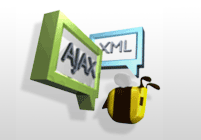What is XML?
"XML is the closest thing to a universal data language for software systems. HTML (for the web) is a type of XML. All significant SQL databases have XML input/output features. Web Services, and now AJAX and Web 2.0, use XML. XML capabilities should be a part of any software investment."
 What do Microsoft Server 2008, Microsoft SQL Server, all Microsoft Office products, and AJAX have in common? They’re all designed to use XML. XML is “extensible markup language”. It’s like HTML for data. Microsoft’s web server, IIS, uses XML for configuration.
What do Microsoft Server 2008, Microsoft SQL Server, all Microsoft Office products, and AJAX have in common? They’re all designed to use XML. XML is “extensible markup language”. It’s like HTML for data. Microsoft’s web server, IIS, uses XML for configuration.
Microsoft has a huge investment in XML. So does the Internet. You should, too.
MS-SQL, MySQL, Oracle, and Legacy Databases
I’ll tell you a secret. If you put 5 developers in a room, at least three of them will know some SQL database language. They’ll be proud of this fact, and they’ll each believe that everyone should have to suffer through SQL.
This is a strange love-hate relationship. The SQL database language is a mature international standard. But it’s crude, almost ugly. And under that skin, it’s fast, and you can do almost anything with it. SQL queries to a database are like big cannons. You aim them carefully, and then you push a button and something truly spectacular happens, very quickly.
Access data reports are easy to do, but a common, complex Access report can require an experienced expert. Fourth Dimension (4D) is a fast and wonderful RAD (Rapid Application Development) system which works on Windows and Mac, but 4D queries are an art form common only to the 4D developer. SQL, on the other hand, is generic, and it scales like no other database in the world.
Very complex queries can sometimes be very simple to achieve, in SQL. This means, SQL is the least expensive to maintain, least expensive to expand, and least expensive to develop, of any data platform. And, SQL is very good with XML.
Finally, there are many report generators for SQL, and MS-SQL has web-based reporting built in. There are few default decisions in technology, but this comes pretty close. Oracle ruled the world at one time, and Microsoft had no database. When the web exploded, Microsoft SQL was already as fast as Oracle, and cost $2000, compared to up to $200,000 for Oracle. MySQL was free, but not yet a strong database. PostgreSQL, was already strong and fast.
Today, these four SQL databases rule together. Most web development today is probably done for MySQL, and almost all corporate development we see here at NSK, is done with MS-SQL, with a small amount in MySQL. We encounter Access database work, but only in smaller systems, and quite often in systems that should or must be migrated into SQL.
What of “combination” application and database systems such as 4D and Delphi? The facts above remain. You should probably be data-warehousing with MySQL or MS-SQL. This is standard advice we would give to any anonymous client.
Written by Keith Mitchell, Senior Developer at NSK Inc
